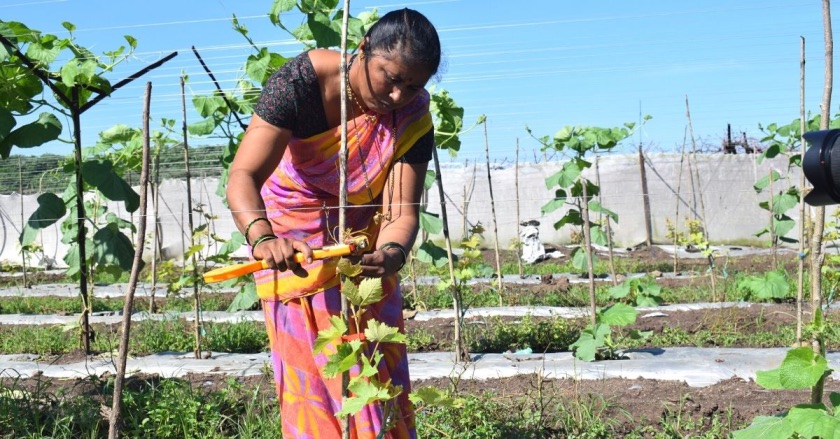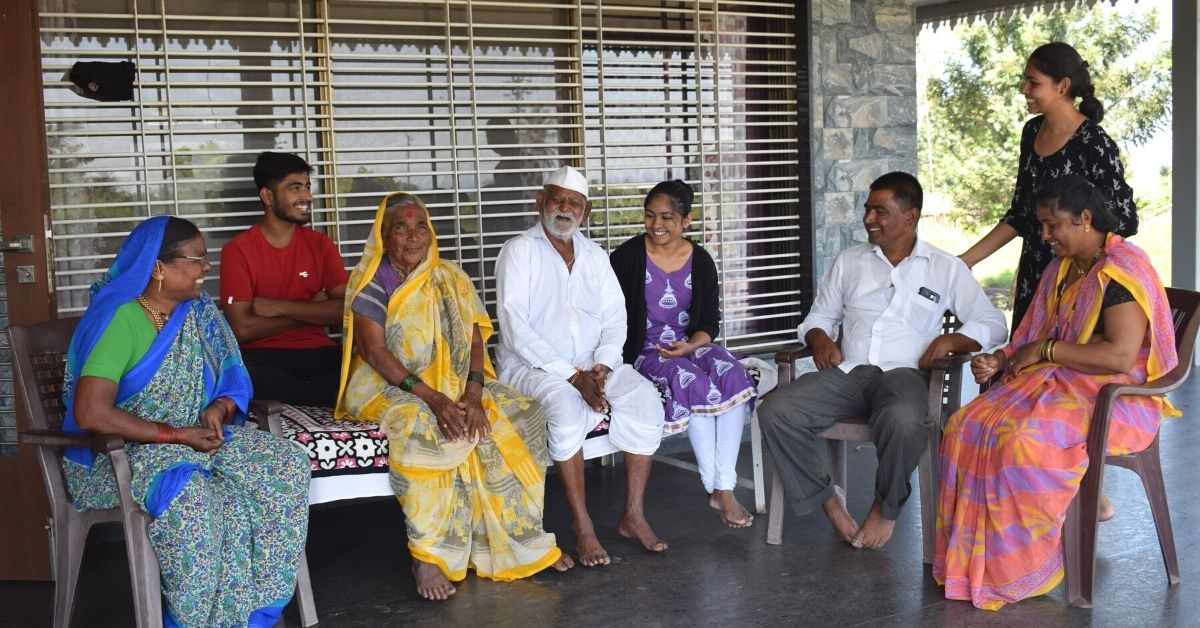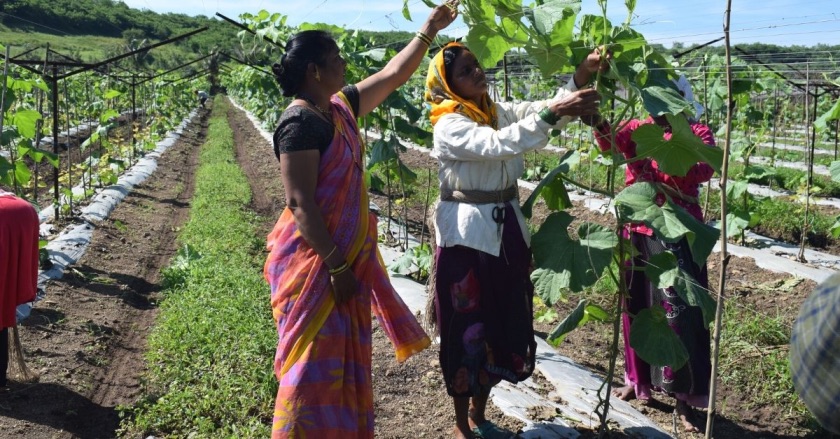Deteriorating financial conditions, debilitating drought, and erratic weather conditions had almost forced the Pawar family to sell off their 8-acre grape vineyard in Nashik to survive. The debt-ridden family was unable to procure more loans, and giving away their ancestral land seemed like the only solution at the time.
However, daughter-in-law Meena felt otherwise. She could foresee the financial misery that selling land and losing the family’s only income source could bring along. So with her “never give up” spirit and grit, she helped her husband and family recover debts worth Rs 23 lakh.
Meena married her husband Namdev in 2000 and moved to Nilwandi village in Nashik. “We worked as farm labourers in neighbouring vineyards for a living. My husband wanted to create a grape vineyard on a small piece of land. But the family had no capital to do so. We needed to find a solution,” she tells The Better India.
An eternal struggle

So Meena mortgaged her jewellery and received Rs 80,000 in return. “We needed money to set up the drip irrigation system and install the infrastructure for the farm,” she says.
Meena took matters into her own hands and worked to build the farm, and by 2004, she and Namdev had established an acre of the vineyard. The couple invested the profits from the sales in expanding the farm. In 2006, they scaled up the vineyard to 4 acres.
“We took an additional loan from a relative to further increase the number of grapevines on the land. By 2009, the vineyard was growing well, and we succeeded in producing quality grapes. Our financial condition seemed to be improving. But little did we know that our spirits were about to be crushed,” the 38-year-old says.
In 2009, Cyclone Phyan resulted in heavy rains, causing severe damage to the vineyard. “The grapes had grown and the harvesting season was about to begin when we lost about 70 per cent of the vineyard to the extreme weather event. The produce and even the vines were lost,” Meena says.
She adds that to add to their woes, the date for repaying their first instalment for the loans was nearing. “Our years of efforts to gain financial stability had dissipated overnight. Till 2011, we repaid the debts and continued farming at a no-profit no-loss basis,” she says. “It became difficult to feed the family and meet our living expenses. To tackle the situation, we decided to purchase a mini-truck at a low cost from an acquaintance. We planned to grow vegetables, transport them to the nearby market and sell the produce. It would provide additional income to the family apart from the vineyard.”
However, the move did not succeed, and turned into a loss-making business instead. The situation worsened when the district faced drought conditions in 2012. “Shortage of water led to drying up of the vineyard, and we lost the vines and produce entirely,” she says, adding that the situation prompted the family to sell off the truck.
“We repaid the loan amount of the truck with all the remaining money we had, and hit rock bottom. Over the years, the loans had piled up and scaled to Rs 23 lakh,” she says.
The family members decided to do away with their ancestral land and repay the debts. “There was little capital in hand, and no agriculture activity was possible owing to the drought situation. But I was against giving up our only source of income and hope. Somehow, I convinced my in-laws to change their decision and even stopped a deal that was underway,” Meena says.

Sharing her ordeal and struggle in convincing the family members, Meena says, “I had zero experience in farming. Everyone felt the stress and burden of the debts, and it became difficult to make rational decisions. There was no ‘Plan B’ on how the selling of land and repaying the loan would help to re-establish our lives from another source of livelihood,” she says.
Meena says that she had many arguments with her husband over the next few weeks. “Namdev said the situation was beyond our capacity to manage, and that I was not able to comprehend the seriousness. But I was worried about raising my two daughters and a son. Without agriculture, we would be landless and homeless,” she recalls.
Meena promised herself that she would learn various aspects of farming and take help from others. “Pursuing agriculture was our only solution as we were best at it,” she notes.
“I knew that a different approach could help us overcome the situation. Namdev eventually agreed,” she adds.
To meet the water requirements of the farm, Meena decided to build a farm pond using a government scheme. “I sought a loan of Rs 3 lakh for the same. Namdev suggested reaching out to Sahyadri Farmer Producer company, an entity formed by grape producers,” she says.
Meena says the move helped them meet their water needs and avail technical know-how from other farmers on how to grow grapes. “The knowledge helped us produce quality grapes that were suitable for export. It also helped us connect with wider local markets that could offer better rates for our farm produce,” she says.
However, Meena and Namdev still lacked funds for recruiting farm labour. “It was only Namdev and I who took care of the maintenance of the farm until the harvest. We could not afford a single labourer and occasionally relied on neighbours for assistance. A friend loaned us the insecticides and pesticides,” she says.
With continuous determination, Meena’s hard work proved successful when their 5-acre land yielded grape produce and an income of Rs 30 lakh in the first harvest. “In 2013, we cleared the loans on the farm pond and the money borrowed from friends and relatives. The following year, the produce earned us an income of Rs 32 lakh, with which we repaid all our pending debts and recovered from the financial burden entirely,” she says.
‘I am strong as ever’

Namdev feels grateful for Meena and says, “We were in a tough situation. Her decision to retain the land was correct, but on the other hand, the debts were piling up. We were also getting a bad deal for selling the land, and if she had not stood ground, it would have made us fall into irrecoverable losses. I am glad that her decision paid off.”
Since then, Meena has led all responsibilities at the vineyard. “By 2018, we managed to build a house for ourselves and eventually buy an additional 16-acre vineyard in Girnare village,” she adds proudly.
The Pawar family has leased out the vineyard to another farmer. “We have expanded our ancestral vineyard to 7 acres now, which earns a decent income. My daughters are pursuing engineering from a reputed college, and my son is studying in a private school. I feel glad that I succeeded despite all the ups and downs,” Meena says.
The years of struggle have made her confident. Meena says, “The COVID-19 pandemic brought new challenges and put us back into some debts. But we have survived the worst and fought strong. The debts do not scare me anymore. I feel as strong as ever.”
She adds, “The hard work has helped provide a comfortable life for my children, and I have attained my life’s purpose.”
Edited by Divya Sethu
No comments:
Post a Comment